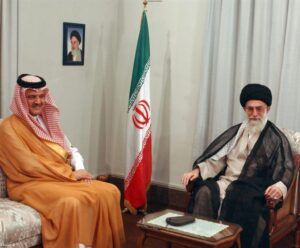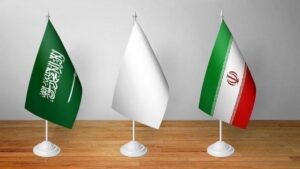Possibility of easing tensions between Iran and Saudi Arabia and a meeting between the leaders of the two countries. Iran and Arabia appear to be moving closer to easing tensions after decades of deadly hostility. They have waged proxy wars against each other for years, especially in war-torn countries like Yemen and Syria. However, top diplomats from both countries held major talks in Iraq last month. The Crown Prince recently weighed in on the prospect of repairing relations with Iran.
Possibility of easing tensions between Iran and Saudi Arabia
it is interesting, we as we were listening to the Crown Prince, resorted to asking ourselves how much can we really take this at face value. These countries have been enemies, frankly. Not just adversaries for a very long time. Going back to the Iranian Revolution at the least and even before some would say.
What do we make of the notion that all of a sudden they can possibly look at forming some kind of conference that sounds like a strong word. Perhaps defusing tension is accurate.
These are two countries that for 40 years have been, it is hard to think of a regional rivalry anywhere in the world that has been as bitter or destructive as that that exists between Iran and Saudi Arabia. I would note that three years ago, the Crown Prince said of the Supreme Leader, he was a fellow who made Hitler look good.
To go from that to maybe we can be friends is quite a change. I think a lot of the change of heart that has happened has to do with the change of government that happened in Washington. Specifically from the Saudi perspective, the Trump administration was immensely supportive of the Saudis.
Supported their war in Yemen, looked the other way when Saudi officials murdered journalist Jamal Khashoggi. And the Trump administration walked out of the Iran nuclear deal. What we expect, Possibility of easing tensions between Iran and Saudi Arabia.
Biden Administration’s Role and Future Prospects
Biden has come in and reversed a lot of that. He has cut support for the war in Yemen. He has given them a little grief about human rights and launched a full-blown diplomatic effort to revive the Iran nuclear deal.
We take that together, with a broader aim that the Biden administration has set on reducing the U.S. presence in the Middle East. They have said it is a dangerous region and our main ally is suddenly a little less interested in giving us that kind of backing.
I think the Saudis are trying to explore a way to reach a more durable or, predictable relationship with their prime rival in a region in a world where they may not have as much support from their primary ally. The Iranians, they would love to get back into the Iranian nuclear deal.
They would love to see the sanctions come off and normalize economic ties with more of the Middle East. I think they probably see smoothing over relations with Saudi as a way to mollify Saudi resistance to the nuclear deal between the U.S. and Iran.
Impact on Regional Conflicts and Broader Implications
Looking at what is happening in Washington, this might be a moment to address these differences. I think it has been interesting to watch the Biden administration. You remember candidate Biden said he would make a pariah out of Saudi Arabia.What is happening is that there is a Possibility of easing tensions between Iran and Saudi Arabia.
When he became President Biden, I think he softened a little. He announced that the U.S. is pulling back support for Saudi Arabia with the conflict in Yemen partially. Only when it came to offensive actions by Saudi Arabia. I see these sort of baby steps. I guess in this region, even baby steps are a big deal.
We know, as you mentioned, that President Biden is looking to revive the Iran nuclear deal negotiations. Tell me how a rekindling of a relationship between these two countries will help Biden with those negotiations. Or, the U.S. in the region in general.
The two main opponents to the Iran nuclear deal were Saudi Arabia and Israel. The relationship between Iran and Israel is not one that can potentially be ever repaired. A better relationship between Iran and Saudi Arabia, as I mentioned, helps modify some of the Saudi opposition to the Iran nuclear deal.
There is a financial incentive for the Saudis and Iranians to reach an accord. Regional rivalries are expensive. No one knows exactly how much money the Iranians spend on proxies and friendly governments, but that is not nothing for an economy that has been crippled by sanctions.
In 2018, there were massive protests in Iran, primarily about corruption and inequality and lack of jobs. A significant number of the protests was also about the fact that Iran was spending money on foreign proxies, rather than domestic needs.Possibility of easing tensions between Iran and Saudi Arabia Provided after years.
From the Iranian perspective, it could take some of the heat out of these proxy wars if they could save billions of dollars every year, that would be a good thing. The Saudis as well. They are trying to diversify their economy. Less money on defense and more money on jobs.
Again, some kind of I wouldn’t want to say normalized or peaceful ties with Iran but, taking some of the temperature out that would enable Saudis to spend less money on regional rivalries.
Rivalries are expensive and both of these countries would like to spend money on other things.
Would any of this have to do with what is going on right now between Israel and Hamas in Gaza? I know that Hamas has, in recent days, publicized the fact that they have been having discussions with Tehran and with Istanbul.
The question I have is, they perhaps see it, if Iran and Saudi Arabia become more closely aligned, that might actually give them a little bit of support for their situation.
I wonder, because, we have not seen a lot of, you know, in years past, you would get very strong annunciation about what is happening between the Israelis and Palestinians from a wide range of countries including some of the Gulf states.
We are not seeing that. I wonder what you make of that. Did you expect, or suspect that this will in any way ease what we have seen between Israel and Hamas? Or will it not matter at all?
I would see the Israel-Palestine situation as somewhat separate from the Iran-Saudi talks. That is more about the implacable hostility between Iran and Israel. Iran has long supported Hamas and that is one of the many bones of contention between Israel and Iran.
You mentioned the other Arab countries. Israel has successfully removed many of the other Arab governments’ concern about Palestine.Possibility of easing tensions between Iran and Saudi Arabia, Is this possible?
The main Arab governments have kind of moved on in a way and have looked to normalize and improve ties with Israel. As a result of the idea that Iran is the main challenge in the region.
The issue going on right now in Gaza and Israel is much more, primarily about domestic Israel-Palestine issues. Secondarily, an Iran-Israel angle. But the Saudi-Iran thing I think is somewhat separate.
Economic Imperatives Driving Reconciliation:Possibility of easing tensions between Iran and Saudi Arabia
The potential thaw in Saudi-Iranian relations represents one of the most significant geopolitical shifts in the Middle East in decades. As these longtime rivals explore diplomatic rapprochement, several key factors will determine whether this détente can be sustained and what it might mean for regional stability.
Both nations face pressing economic challenges that make continued hostility increasingly untenable. For Iran, crippling U.S. sanctions have devastated its economy, with inflation exceeding 50% and unemployment remaining stubbornly high.
The 2018 protests that swept across 100 Iranian cities demonstrated growing public frustration with the government’s prioritization of regional proxies over domestic welfare. Possibility of easing tensions between Iran and Saudi Arabia, Something about to happen.
Saudi Arabia, while wealthier, faces its own economic transition challenges under Vision 2030. The kingdom seeks to diversify beyond oil, with ambitious projects like NEOM requiring stable regional relations and foreign investment.
The costly Yemen war – estimated at over $100 billion – has become particularly burdensome as global oil prices fluctuate. Washington’s shifting Middle East policy under different administrations has significantly impacted Saudi-Iran dynamics.
The Trump administration’s “maximum pressure” campaign against Iran and unquestioning support for Saudi Arabia created an environment where Riyadh felt empowered to confront Tehran aggressively.
The Biden administration’s recalibration – including ending support for offensive operations in Yemen and attempting to revive the nuclear deal – has forced Saudi leaders to reassess their strategic position.
With the U.S. increasingly focused on China and domestic issues, Gulf states recognize they can no longer rely on unconditional American backing in regional conflicts. The possibility of de-escalation between Iran and Saudi Arabia is imminent given the upcoming events.
Potential Roadblocks to Reconciliation
Challenges of Possibility of easing tensions between Iran and Saudi Arabia. Several obstacles could derail this diplomatic opening:
- Nuclear Deal Uncertainty: If JCPOA negotiations collapse, renewed U.S. sanctions could harden Iran’s position.
- Regional Flashpoints: Any escalation between Israel and Iranian proxies could force Saudi Arabia to take sides.
Implications for Regional Stability
Advantages of Possibility of easing tensions between Iran and Saudi Arabia. A genuine Saudi-Iran détente could:
- Reduce violence in Yemen and facilitate humanitarian relief
- Ease tensions in Gulf shipping lanes
- Create opportunities for economic cooperation on energy and infrastructure
- Potentially lead to a regional security framework involving other Gulf states
However, analysts caution that even successful negotiations would likely produce limited cooperation rather than true alliance. The two nations will remain competitors for regional influence, just through more diplomatic and economic means rather than proxy conflicts.
you can read more about of Possibility of easing tensions between Iran and Saudi Arabia Here or Here.



